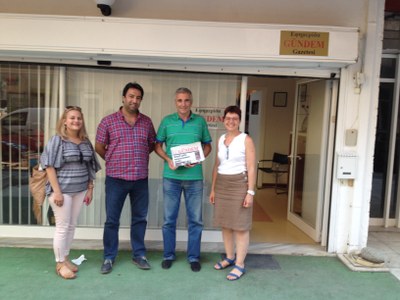Turkish community in Greece, another discriminated minority
Aug 20, 2015
On July 24th 1990, Sadik Ahmet died in car accident. Sadik, a medical doctor, was founder of the Friendship, Equality and Peace Party (DEB, by its acronym in Turkish), leader of the Turkish community in Greece, defender of the linguistic, cultural and human rights of its community and former member of the Greece Parliament.
In a very touching ceremony, at the cemetery of Komotini, more than one thousand people gathered to remember the former Sadik Ahmet.
Approximately 150.000 people, mostly located in Western Thrace, form the Turkish community in Greece. The economy of the region is based in agriculture and it is one of the less developed in Greece. So, the Turkish community face a challenging future due to the lack of opportunities that young people has to establish in the area and set up a family. Emigration to other European countries, mostly to Germany, seems to be the sole hope for young people.
I had the opportunity to meet members of several civil society associations and to learn about the situation of the community and its lack of full cultural and linguistic rights as well as the social situation.
The Treaty of Lausanne signed in 1923 between Greece and Turkey, among others, granted cultural and political rights to both the Greek community in Turkey and the Turkish community in Greece. However, this Treaty and the interpretation of Greek authorities are an obstacle for the full recognition of the Turkish of Greece.
For instance, the Treaty of Lausanne granted the Turkish in Greece the right to bilingual education (Greek and Turkish) in primary schools, but said nothing about secondary or elemental education (kindergartens). Now, both are compulsory in Greece, but the government doesn’t authorise the opening of bilingual kindergartens and the offer of bilingual secondary schools is, by far, smaller that the demand. No new secondary schools are authorise to be opened.
Furthermore, after the Cyprus crisis of 1983 and the invasion of Turkish troops of the island, Greek authorities issued a law prohibiting the use of the word ‘Turkish’. As a consequence of organizations bearing that adjective, like the Turkish Teachers Association, were declared out of law.
Turkish people in Greece are officially ‘muslin Greeks’! Crazy! As one member of that community told me: ‘my language and culture are Turkish, but I can’t define my self as such. I’m atheist. I’m not muslin. So, what am I?’
The Turkish community in Greece is another victim of the lack of commitment of European authorities to push forwards a firm policy to protect the rights of minorities within the borders of the EU. Practically, member states can do whatever the want about the rights of cultural and linguistic minorities. Brussels will look elsewhere.




